Should you have a TV in the bedroom? These experts put the debate to rest, definitively
TV in the bedroom – a thumbs up or thumbs down? Let's find out what the experts say
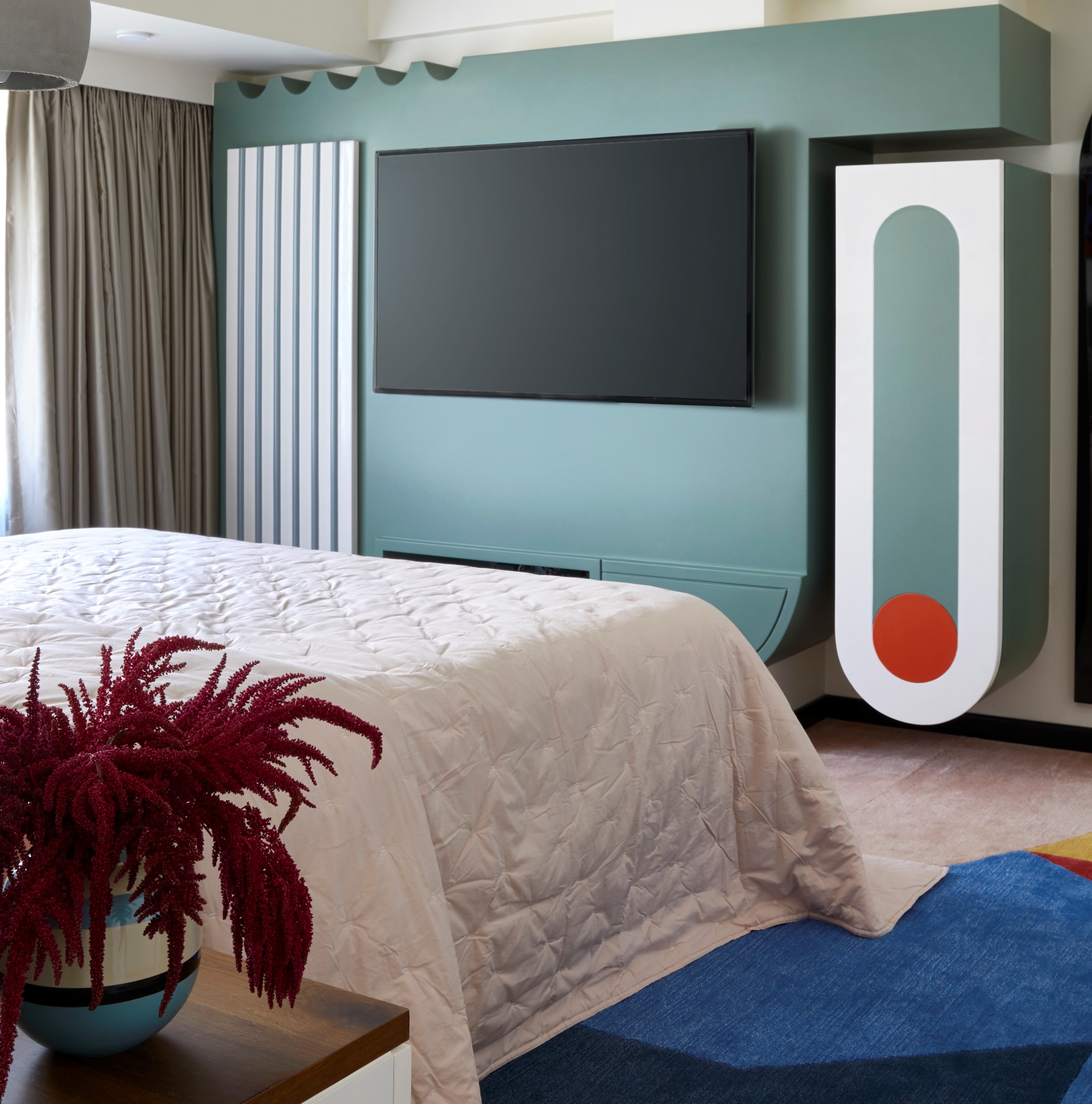

It's the eternal debate – should you have a TV in the bedroom? Many couples find themselves on opposite sides of this battle, and for good reason. The bedroom is a space for deep relaxation and switching off from the world, and having a TV in this space can be both a boon and a bane.
The appeal of watching TV in bed is, for plenty of people, understandable – yet it might not be the best choice for your sleep hygiene. The blue light emitting from it might just disrupt your circadian rhythm, plus the desire to binge-watch shows can disturb your sleep routine as you settle in for 'just one more episode'.
There's also the question of how a TV fits into the design of a modern bedroom. TVs are hard to incorporate beautifully into any room, but space in a bedroom is much more limited than a living room, for example.
So, is a TV advisable to have one or not? To settle this debate, we asked the experts, both in sleep and interior design, for their advice.

Aditi is a homes writer and editor with several years of experience. Her articles, backed by expert insights, offer suggestions aimed at helping readers make the best home design choices. For this article, she spoke to several designers to understand whether or not, having a TV in the bedroom is a good idea.
Will a TV in the bedroom affect my sleep?
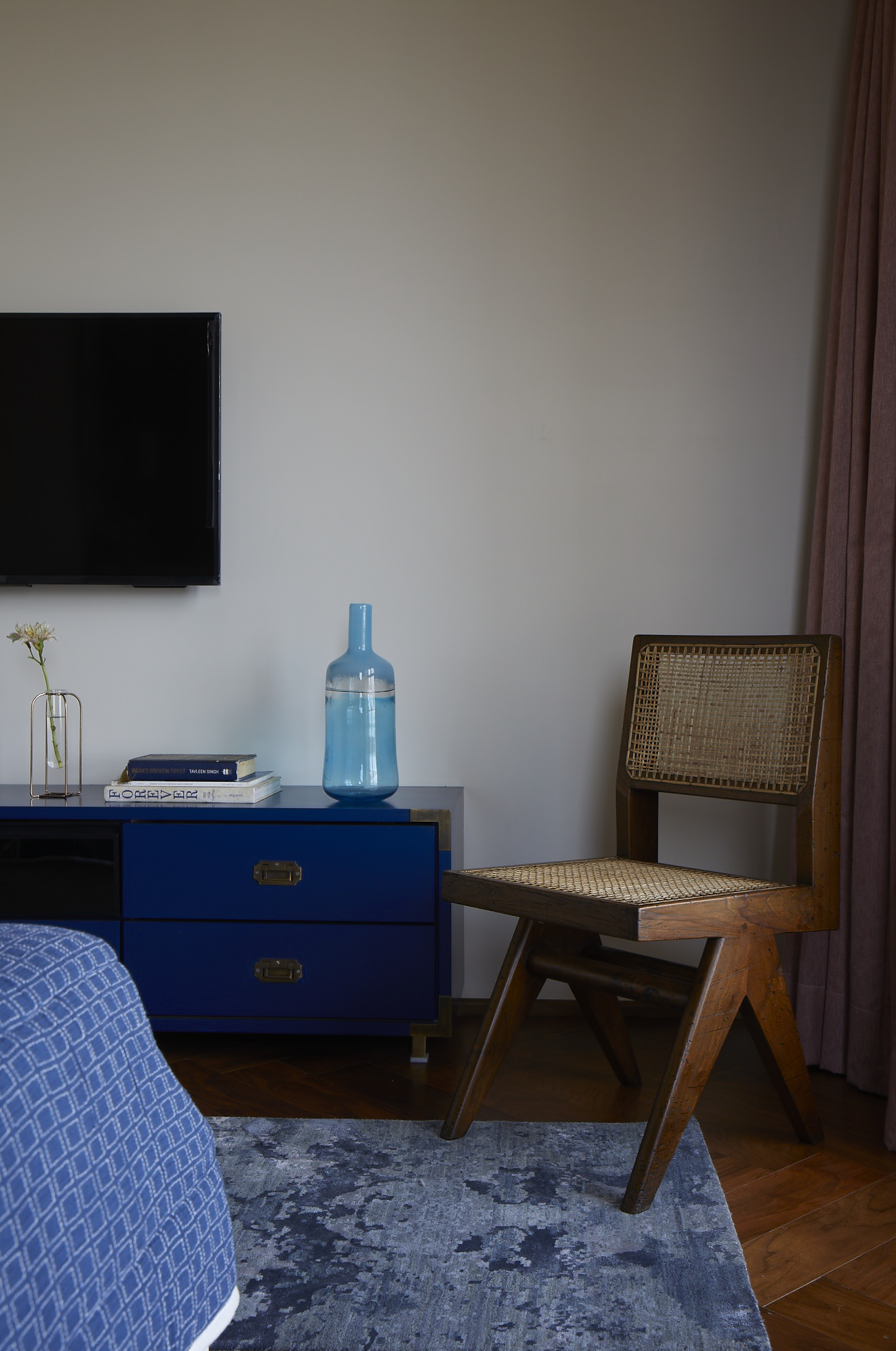
When it comes to getting a good night's sleep, it is believed that the TV not only keeps us up later at night but too much pre-sleep viewing can disrupt sleep cycles.
'The bedroom should be a welcoming place and the perfect sleep environment is usually cool, quiet, dark, clutter-free and features a comfortable supportive bed,' says Lisa Artis, deputy CEO of The Sleep Charity. 'We advise that electronic devices are switched off an hour before bedtime, or banned from the bedroom.'
'There are impacts around having a TV in the bedroom,' says Lisa. 'Firstly, there is the danger that bright screens in the hour before bedtime can affect our sleep (in particular, how long it takes for us to fall asleep) by suppressing the sleep hormone, melatonin and disrupting the body’s circadian rhythms. Secondly, the hyper-alertness that comes after watching a particular high-octane, cliff-hanger episode. Binge-watching has become a normal viewing habit as the temptation to stay up to find out what happens next is too much for some. However, the knock-on effect is that people are skipping sleep or making themselves tired because of it.'
The Livingetc newsletters are your inside source for what’s shaping interiors now - and what’s next. Discover trend forecasts, smart style ideas, and curated shopping inspiration that brings design to life. Subscribe today and stay ahead of the curve.
'If you do have a TV in your bedroom, our best advice is to try to make sure you turn off the TV (and any other electronic devices) at least an hour before bed,' says Lisa. 'However, if you find watching TV relaxing, make sure you watch something more light-hearted or content that is familiar rather than something violent, gore or thrilling, which can leave some people feeling anxious before bed. And remember to turn your TV off because even exposure to the weakest glow at night such as your TV’s standby button can reduce melatonin levels.'
Should you have a TV in the bedroom?
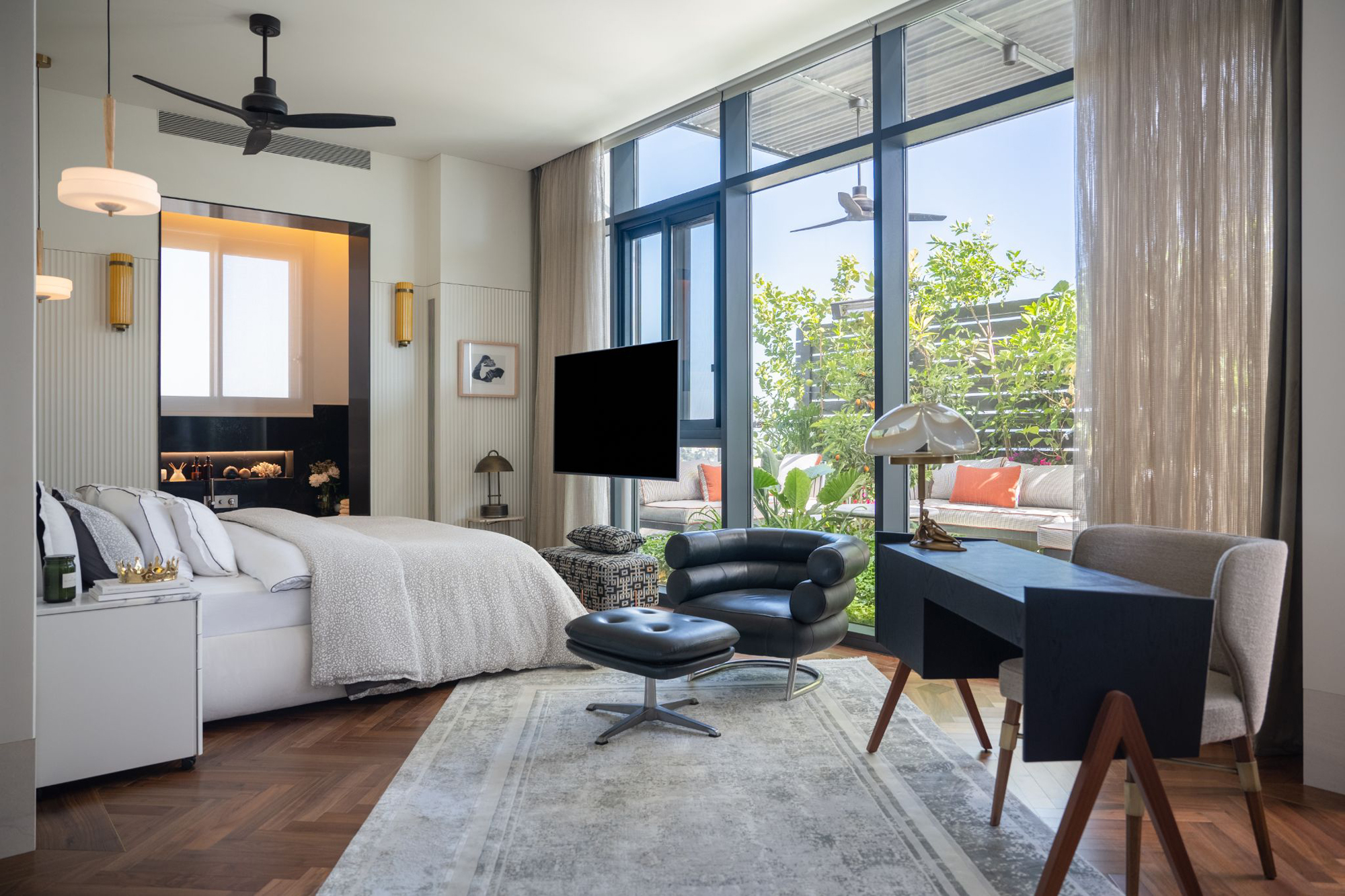
There are pros and cons to both to both stances, so the answer might be different for different people – it truly depends on your lifestyle and how you define 'winding down.'
'Honestly, this is a personal choice,' say interior designers Jenna Choate-James and Mariana Ugarte of Interior Fox. 'If you're someone who likes to wind down and read a book, it's hard to do when you have a TV. However, it's also nice to have some hot tea in bed while watching a movie, as there is nothing cozier!'
For some people, the evenings provide a valuable opportunity to meditate, evaluate, and even spend time talking to loved ones. The bedroom becomes an oasis for reflection and introspection. And so, there is no need for a TV in that environment. Light reading in the evening helps many fall asleep faster.
On the other hand, some others look for a little bit of entertainment before calling it a night. Just bear in mind, some people refer to a TV in a bedroom as a 'passion killer' for this very reason.
So should you have a TV in a bedroom? Honestly, if you can do without, do. Differentiating the use of your spaces will help signal to your brain that a bedroom is for sleep.
But, our designers say it isn't a design crime, and that there are ways to make a TV in a bedroom work. So, if you're committed to that evening binge-watch in bed, we asked interior designers how they tackle layouts and more in a bedroom when a TV is involved.
1. Hide it well
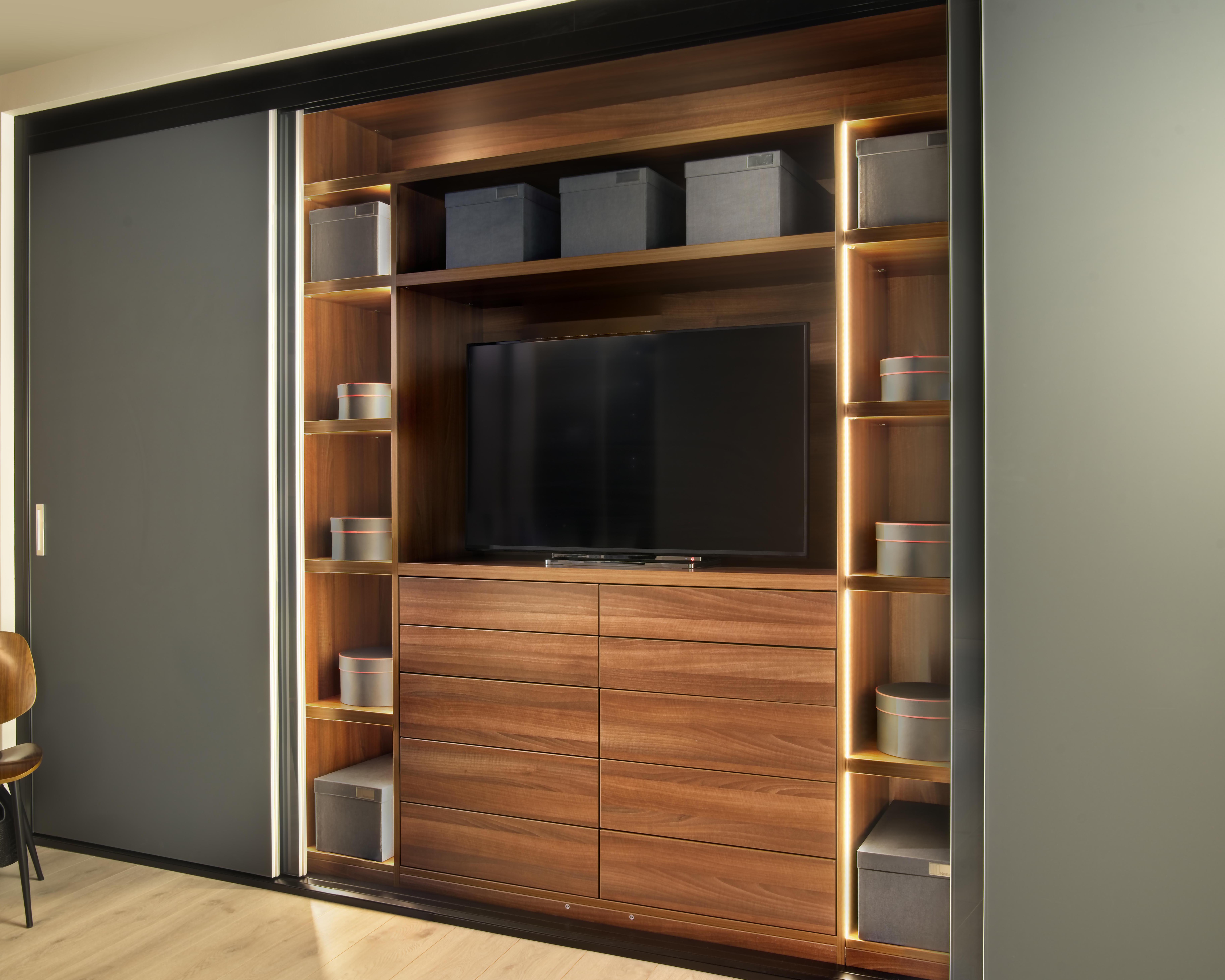
If you do decide to keep the TV in the bedroom, and you don't want it to draw any attention, plus you want to keep all the lights emitting from it far away from your sleeping area, then consider hiding it inside a unit; one that blends with the rest of the room. Consider hiding it inside a unit that has a sliding door or built-in storage that allows you to keep all the gadgets out of sight.
'If you choose to have a TV in the bedroom, it's best to have it seem like art like the Frame TV by Samsung or have it hidden in a cabinet that you can open when you want to use it,' say Jenna and Mariana. 'This will help keep the room feeling like a relaxing bedroom and not centered around the TV.'
2. Create a beautiful bespoke unit
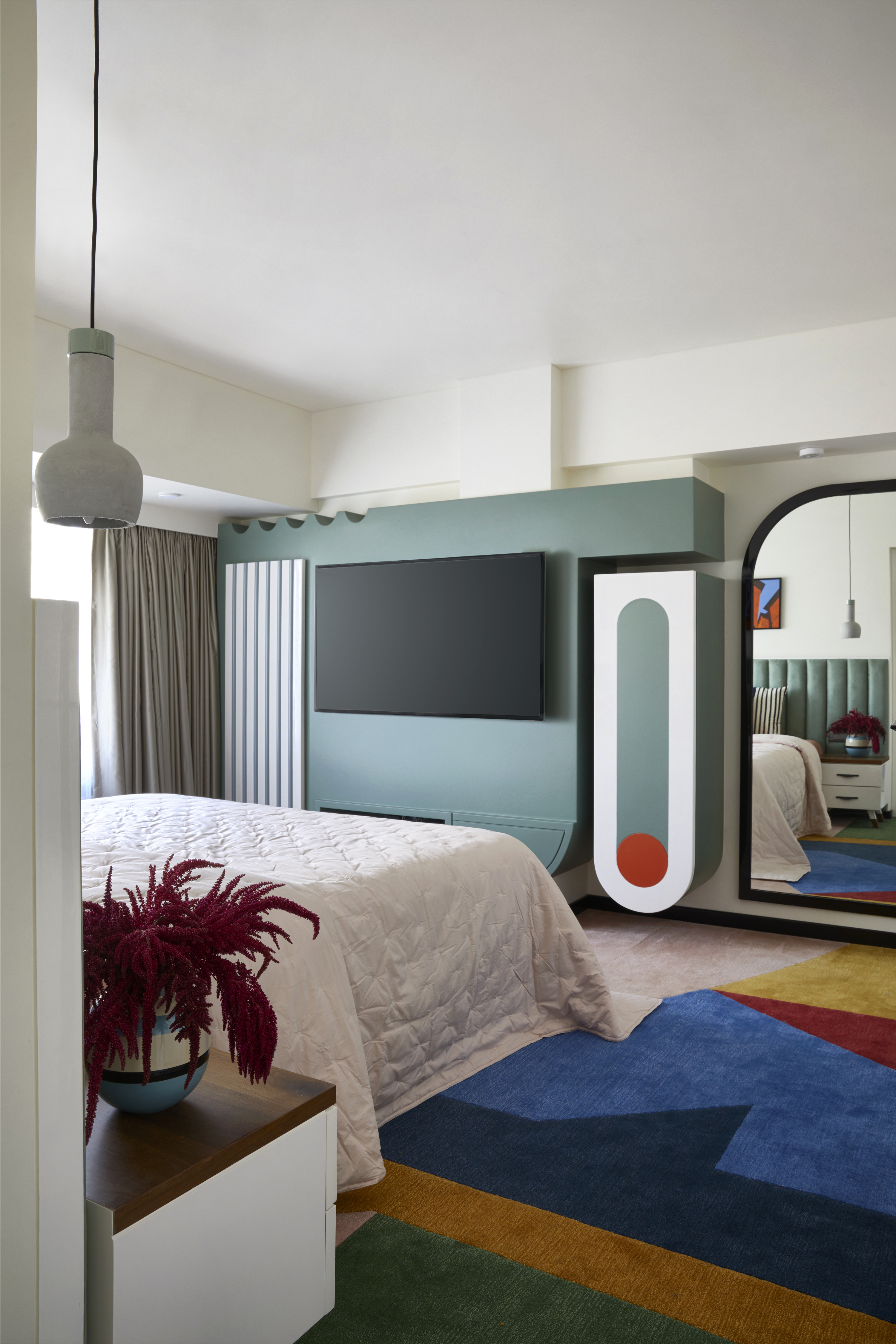
'I will say that gone are the old days when everyone wanted to hide their TVs as they were big, ugly brutes,' says Emma Deterding, founder and creative director of Kelling Designs. 'Now, in the right place, with the right care, and with so many modern, designer-led options available from the best TV brands, they can look quite smart.'
'For a luxury bedroom look, add the TV inside a built-in joinery that not only provides the perfect space for the TV, but will also bring in ample amount of storage for you to display your favorite items, whilst keeping clutter at bay,' says Emma. 'If you have a TV that has the option to display art when not in use, then why not create a gallery wall and incorporate the TV into this so it fits in seamlessly.'
Create a focal point with the TV by painting it in beautiful, stand-out colors. Allow it to look like an art piece, and give your room a special vibe.
3. Choose the best location

Whether it's the couple's bedroom or guest bedroom, finding the right location for the TV in a bedroom is important, as it dictates your TV-viewing experience and also ensures your eyes don't get fatigued with too little or too much TV-to-bed distance.
The best place to put a TV in a bedroom is right across from the bed as this is the easiest place for viewing. Alternatively, you can place it on top of a dresser, at the end of the bed, inside a built-in cabinet, or in the corner of the room (in case you don't watch TV too much).
If you choose to mount the TV on the wall, hang it at eye level. This is a calculation based on your seated height plus the height of your bed, the distance of the screen from your seat, and the height of your TV screen. One way of figuring this out is by taking an inch-tape and measuring your eye height from the floor and installing the TV at the same height, on the wall. Also when installed high on a wall, make sure the TV is properly tilted downward so it’s geared toward the proper eye level.
The optimum viewing distance from the television is 2.5 times the diagonal length of the screen.

Aditi Sharma Maheshwari started her career at The Address (The Times of India), a tabloid on interiors and art. She wrote profiles of Indian artists, designers, and architects, and covered inspiring houses and commercial properties. After four years, she moved to ELLE DECOR as a senior features writer, where she contributed to the magazine and website, and also worked alongside the events team on India Design ID — the brand’s 10-day, annual design show. She wrote across topics: from designer interviews, and house tours, to new product launches, shopping pages, and reviews. After three years, she was hired as the senior editor at Houzz. The website content focused on practical advice on decorating the home and making design feel more approachable. She created fresh series on budget buys, design hacks, and DIYs, all backed with expert advice. Equipped with sizable knowledge of the industry and with a good network, she moved to Architectural Digest (Conde Nast) as the digital editor. The publication's focus was on high-end design, and her content highlighted A-listers, starchitects, and high-concept products, all customized for an audience that loves and invests in luxury. After a two-year stint, she moved to the UK and was hired at Livingetc as a design editor. She now freelances for a variety of interiors publications.